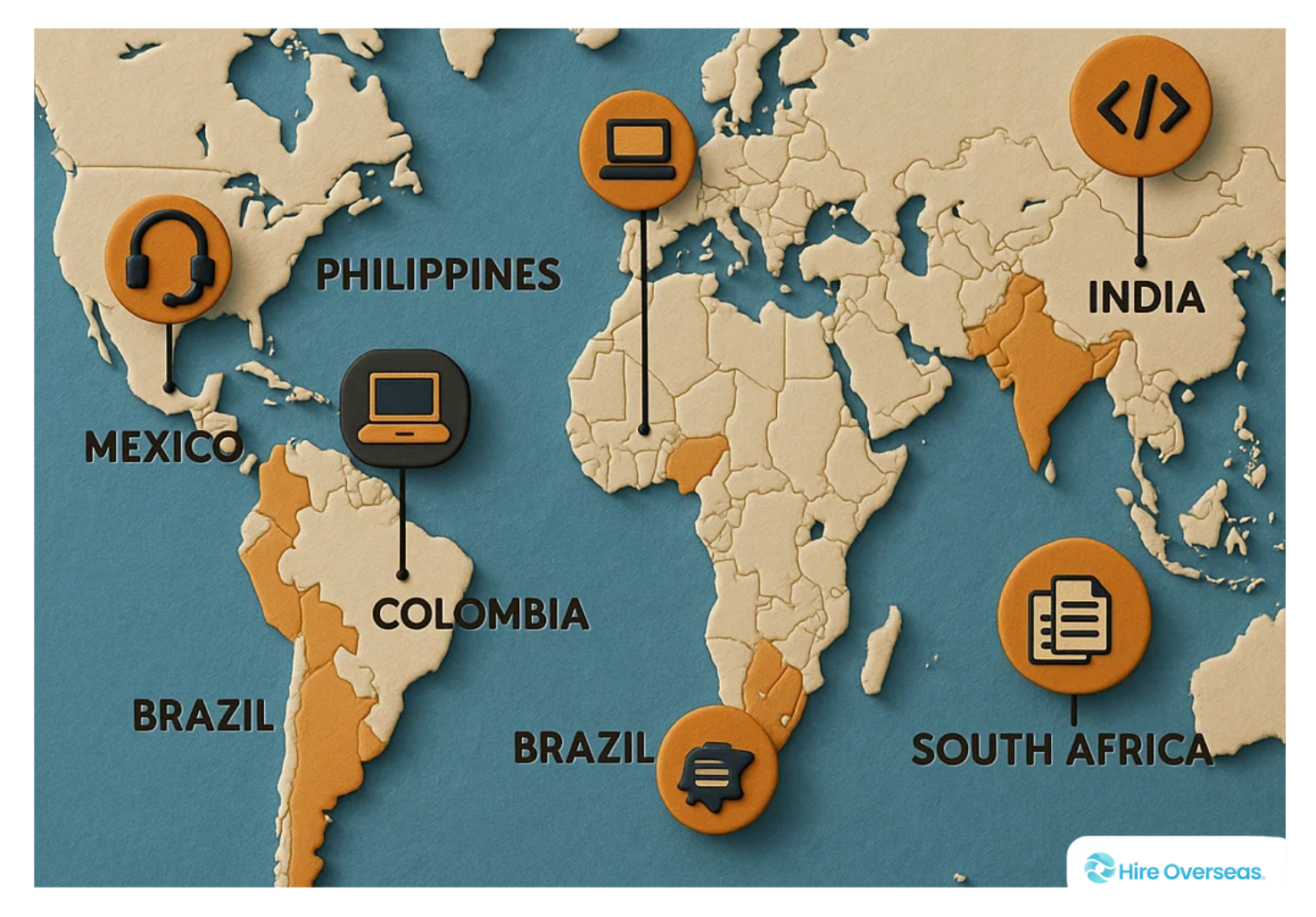Hiring Remote Workers in the Philippines: Why Filipino Talent is Powering Global Teams in 2025

In today’s global workforce, hiring remote workers in the Philippines has emerged as a game-changing strategy for companies seeking top-tier talent, cost efficiency, and cultural compatibility. Filipino professionals offer a rare blend of strong English proficiency, Western business acumen, and a deep commitment to quality work. With savings of up to 70% and access to skilled talent across roles—from virtual assistants to developers—businesses can scale smarter without compromising quality. But it’s more than economics. Filipino remote workers bring warmth, loyalty, and a people-first mindset that makes them feel like true team members, not just outsourced support. In 2025, the Philippines is not just an option, it’s a competitive advantage.
Why the Philippines is the Top Choice for Remote Teams
Talent That Speaks Your Language — Literally and Culturally
The Philippines is home to a highly educated workforce, with hundreds of thousands of graduates entering industries like business, IT, and finance each year. English is widely spoken and taught from an early age, so working with Filipino professionals often feels seamless from day one. But it’s not just about language—it’s about understanding. Many Filipinos are already familiar with Western business practices, which helps bridge cultural gaps and makes collaboration feel natural.
Cost Savings That Go Beyond the Bottom Line
Yes, hiring from the Philippines can save up to 70% in labor costs compared to local hiring. But the impact goes deeper than numbers. For startups, it can mean hiring two or three skilled professionals instead of one. For growing companies, it can free up resources to invest back into product development, marketing, or employee benefits. The cost advantage opens doors to growth while giving businesses access to world-class talent.
A Culture of Commitment and Care
One of the most talked-about qualities of Philippines workers is their dedication—not just to the job, but to the team and company they work with. When you hire Filipino workers, you’re often bringing on people who take pride in doing their best and value long-term relationships. Loyalty, adaptability, and a service-first mindset are woven into the culture, which is why so many companies say their Filipino remote team members feel like an integral part of the business rather than just outsourced support.
“Our Filipino team is the backbone of our business. They’re the reason clients are happy, projects get done, and chaos stays in check.” - Harlan Rappaport, Co-founder of Hire Overseas
People-First Values That Build Lasting Teams
One of the unique strengths of the Filipino workforce is a strong sense of community and teamwork. Collaboration isn’t just a skill; it’s a value that runs deep in the culture. When hiring remote workers in the Philippines, companies often find that their new team members bring not only technical expertise but also empathy, kindness, and a genuine desire to see the entire team succeed. This people-first approach fosters long-term relationships and high retention rates.

Popular Remote Roles Filled by Filipino Professionals
One of the biggest advantages of hiring remote workers in the Philippines is the wide range of roles you can fill with highly skilled, dependable talent. Whether you’re a startup building your first team or a growing company scaling departments, the Philippines offers professionals who can step into critical positions and deliver from day one.
Virtual Assistants & Admin Staff
Known for their organization and attention to detail, Filipino VAs keep your operations running smoothly. From inbox management to scheduling and reporting, they free up your time so you can focus on strategic work.
Bookkeepers & Accountants
Filipino finance professionals bring precision and reliability, with expertise in tools like Xero and QuickBooks. Many are trained to work with international tax standards, making cross-border accounting seamless.
Customer Support Agents
Filipinos are naturally service-oriented and empathetic, making them ideal for customer-facing roles. Whether through voice, chat, or email, they deliver brand-aligned support that keeps customers happy and loyal.
Digital Marketing Specialists
From SEO and content creation to paid ads and social media, Filipino marketers combine creativity with data-driven strategies to help brands grow in competitive markets.
Designers & Developers
Creative problem-solvers and technically skilled, Filipino designers and developers can take ideas from concept to polished digital products without heavy handholding.
And these roles are just the beginning. Hiring from the Philippines allows you to build entire departments offshore, creating a scalable, blended workforce that supports every aspect of your business.
Salary Ranges for Popular Remote Roles in the Philippines
Now that you’ve seen the most in-demand roles filled by Filipino professionals, the next question is often: what does it cost to hire them? Here’s a breakdown of typical salary ranges businesses pay when hiring remote workers in the Philippines.
Salary Ranges by Role (Approx.)
Virtual Assistants & Admin Support: $600–$1,200/month
Filipino virtual assistants handle everything from scheduling and email management to research and reporting. Their ability to take on admin tasks efficiently frees business owners and managers to focus on growth.
Bookkeepers & Accountants: $800–$1,500/month
Experienced in global finance tools and reporting, many Filipino accountants are trained to work with US, UK, and AU tax standards.
Customer Support Agents: $700–$1,200/month
Known for empathy and professionalism, Filipino support staff excel in voice, chat, and email-based customer service.
Digital Marketing Specialists: $1,000–$1,800/month
Skilled in SEO, paid ads, content strategy, and social media, they help brands grow in competitive online markets.
Developers & Designers: $1,500–$3,000+/month
From front-end developers to UX/UI designers, Filipino tech professionals deliver quality digital products and creative assets.
(Rates vary depending on experience, specialization, and whether you hire directly or through a hiring partner.)
Other Costs to Factor In:
- Mandatory benefits such as 13th-month pay (for employees).
- Payroll and tax compliance fees.
- Onboarding, training, and software subscriptions to set your team up for success.
Should You Hire Filipino Workers Directly or Use a Partner?
When you’re ready to start hiring in the Philippines, one of the first decisions you’ll face is whether to manage the process yourself or work with a recruitment partner. Both options have their advantages.
Hiring Filipino Workers Directly
Going the direct route gives you full control over recruitment and allows you to build personal relationships with your team from day one. However, it also means you’ll need to handle:
- Navigating Philippine labor laws and contracts
- Setting up compliant payroll and tax processes
- Managing recruitment, vetting, and onboarding on your own
For businesses with in-house HR or experience with international hiring, this can work well. For smaller companies, the administrative load can quickly become overwhelming.
Working With a Hiring Partner
A trusted recruitment and HR partner simplifies the entire process by managing compliance, payroll, and candidate vetting for you. They can also help ensure cultural alignment and long-term retention of your Philippines staff.
Discover how Filipino talent can transform your business. Hire remote workers from the Philippines with Hire Overseas and get matched with the right professionals for your team.

Challenges When Hiring Remote Workers in the Philippines (and How to Solve Them)
Like any remote workforce, hiring from the Philippines comes with its own set of challenges. The good news? Most can be prevented or managed with the right approach.
Weather-Related Disruptions
The Philippines experiences seasonal typhoons that can occasionally cause power or internet outages. This can be a concern for companies relying on uninterrupted workflows.
Solution: Many experienced Philippines workers already have contingency plans, such as backup power, mobile internet, and access to co-working spaces. When you hire Filipino workers, include questions about their backup systems during interviews to ensure reliability.
Time Zone Overlaps
While US companies hiring remote workers in the Philippines benefit from opposite time zones for 24/7 coverage, others may struggle with real-time collaboration.
Solution: Set clear expectations during the hiring process. Many Philippines staff are open to adjusting schedules to overlap with Western business hours, especially when roles require it.
Understanding Legal and Payroll Requirements
When hiring remote workers in the Philippines, businesses often underestimate how different labor laws, contracts, and tax obligations can be compared to their home country. Without the right systems in place, it’s easy to run into compliance issues that affect both your company and your team.
Solution: Start by learning the basics of Philippine labor regulations, including mandatory benefits and contract structures. If you don’t have in-house expertise, consider working with a recruitment and HR partner who can handle payroll, contracts, and compliance on your behalf. This not only protects your business but also ensures a smooth experience for your new Philippines staff. Working with an all-in-one service like Hire Overseas gives you a seamless way to hire in the Philippines. We handle payroll, contracts, and compliance so you can focus entirely on growing your team.
Common Myths About Hiring Filipino Remote Workers
When companies first consider hiring remote workers in the Philippines, they often encounter misconceptions that can hold them back from tapping into world-class talent. Here are some of the most common myths—and the truth behind them.
Myth: Filipino Workers Are Only Suited for Entry-Level Tasks
Truth: The Philippines has a deep pool of experienced professionals across industries. Many companies hiring Filipino workers today are building entire tech, finance, and creative departments with mid- and senior-level talent.
Myth: Filipino Remote Workers Can’t Handle Leadership Roles
Truth: Beyond technical expertise, many Philippines workers excel in project management, team leadership, and strategic planning. As remote work has grown, more companies are promoting Filipino professionals into senior and managerial roles.
Myth: Hiring From the Philippines Is Only for Large Companies
Truth: Hiring from the Philippines benefits businesses of all sizes. Startups often hire their first VA or bookkeeper in the Philippines, while enterprises build entire departments offshore. The model scales up or down depending on your needs.
Myth: Cultural Differences Will Create Barriers
Truth: Filipino professionals are known for their cultural adaptability and familiarity with Western business practices. When you hire in the Philippines, you often find the cultural alignment makes collaboration feel natural from the start.
The Future of Building Remote Teams in the Philippines
As global businesses continue to embrace distributed work, the Philippines stands out as one of the best places to find skilled, reliable, and culturally aligned talent. From virtual assistants to senior developers, hiring Filipino workers offers a blend of quality and affordability that few other markets can match.
Whether you choose to hire in the Philippines directly or work with a trusted partner, the key is to approach it strategically—understanding the roles you need, respecting cultural nuances, and creating a solid onboarding and management process.
Companies that invest in Filipino staff aren’t just filling positions; they’re building long-term partnerships with professionals who value loyalty, teamwork, and delivering their best work.
Want to build your own high-performing offshore team? Hire remote workers from the Philippines with Hire Overseas and access skilled Filipino talent tailored to your business needs.
FAQs About Hiring Remote Workers in the Philippines
How quickly can I hire a Filipino remote worker?
If you're hiring independently, it may take 2–4 weeks to recruit, vet, and onboard a candidate. With a hiring partner like Hire Overseas, the process can be completed in as little as 7–10 days, depending on the role.
What’s the best way to evaluate Filipino candidates remotely?
Conduct structured interviews via Zoom, assess communication skills, give practical test tasks, and request work samples or portfolios. Hiring through a vetted partner can also streamline candidate screening and skill validation.
Can Filipino remote workers be hired for long-term roles?
Absolutely. Many Filipino remote professionals are looking for long-term, stable positions and are highly loyal when treated well. With the right onboarding and management, you can build lasting relationships.
How does cultural alignment affect team performance?
Filipino professionals tend to value respect, collaboration, and accountability—traits that foster positive team dynamics. Their cultural alignment with Western norms often enhances productivity and reduces miscommunication.
Browse Categories
Unlock Global Talent with Ease
Hire Overseas streamlines your hiring process from start to finish, connecting you with top global talent.

.png)






